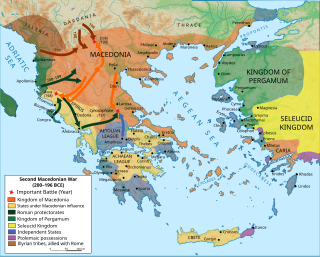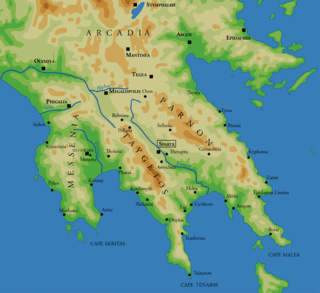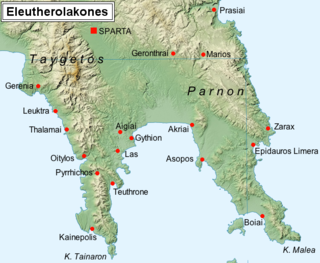Related Research Articles

This article concerns the 200 BC decade, that lasted from 209 BC to 200 BC.
This article concerns the period 189 BC – 180 BC.
This article concerns the period 199 BC – 190 BC.
Year 205 BC was a year of the pre-Julian Roman calendar. At the time it was known as the Year of the Consulship of Scipio and Dives. The denomination 205 BC for this year has been used since the early medieval period, when the Anno Domini calendar era became the prevalent method in Europe for naming years.
Year 195 BC was a year of the pre-Julian Roman calendar. At the time it was known as the Year of the Consulship of Flaccus and Cato. The denomination 195 BC for this year has been used since the early medieval period, when the Anno Domini calendar era became the prevalent method in Europe for naming years.
Year 193 BC was a year of the pre-Julian Roman calendar. At the time it was known as the Year of the Consulship of Merula and Thermus. The denomination 193 BC for this year has been used since the early medieval period, when the Anno Domini calendar era became the prevalent method in Europe for naming a year.
Year 188 BC was a year of the pre-Julian Roman calendar. At the time it was known as the Year of the Consulship of Messalla and Salinator. The denomination 188 BC for this year has been used since the early medieval period, when the Anno Domini calendar era became the prevalent method in Europe for naming years.
Year 219 BC was a year of the pre-Julian Roman calendar. At the time it was known as the Year of the Consulship of Paullus and Salinator. The denomination 219 BC for this year has been used since the early medieval period, when the Anno Domini calendar era became the prevalent method in Europe for naming years.

Philip V was king of the ancient Greek kingdom of Macedon from 221 to 179 BC. Philip's reign was principally marked by the Social War in Greece and a struggle with the emerging power of the Roman Republic. He would lead Macedon against Rome in the First and Second Macedonian Wars. While he lost the latter, Philip later allied with Rome against Antiochus III in the Roman-Seleucid War. He died in 179 BC from illness after efforts to recover the military and economic condition of Macedonia and passed the throne onto his elder son, Perseus of Macedon.

The Second Macedonian War was fought between Macedon, led by Philip V of Macedon, and Rome, allied with Pergamon and Rhodes. Philip was defeated and was forced to abandon all possessions in southern Greece, Thrace and Asia Minor. During their intervention, although the Romans declared the "freedom of the Greeks" against the rule from the Macedonian kingdom, the war marked a significant stage in increasing Roman intervention in the affairs of the eastern Mediterranean, which would eventually lead to Rome's conquest of the entire region.

Nabis was the last king of independent Sparta. He was probably a member of the Heracleidae, and he ruled from 207 BC to 192 BC, during the years of the First and Second Macedonian Wars and the eponymous "War against Nabis", i.e. against him. After taking the throne by executing two claimants, he began rebuilding Sparta's power. During the Second Macedonian War, Nabis sided with King Philip V of Macedon and in return he received the city of Argos. However, when the war began to turn against the Macedonians, he defected to Rome. After the war, the Romans, urged by the Achaean League, attacked Nabis and defeated him. He then was assassinated in 192 BC by the Aetolian League. He represented the last phase of Sparta's reformist period.

Philopoemen was a skilled Greek general and statesman, who was Achaean strategos on eight occasions.

The siege of Gythium was fought in 195 BC between Sparta and the coalition of Rome, Rhodes, the Achaean League, and Pergamum. As the port of Gythium was an important Spartan base, the allies decided to capture it before they advanced inland to Sparta. The Romans and the Achaeans were joined outside the city by the Pergamese and Rhodian fleets. The Spartans held out, but one of the joint commanders, Dexagoridas, decided to surrender the city to the Roman legate. When Gorgopas, the other commander, found out, he killed Dexagoridas and took sole command of the city. After Dexagoridas' murder, the Spartans held out more vigorously. However, Titus Quinctius Flamininus of the allied forces arrived with 4,000 more men and the Spartans decided to surrender the city on the condition that the garrison could leave unharmed. The result of this siege forced Nabis, the tyrant of Sparta, to abandon the surrounding land and withdraw to the city of Sparta. Later that year, Sparta capitulated to the allies.
Lucius Quinctius Flamininus was a Roman politician and general who served as consul in 192 BC alongside Gnaeus Domitius Ahenobarbus. He was eventually expelled from the Senate by Cato the Elder.

The Laconian War of 195 BC was fought between the Greek city-state of Sparta and a coalition composed of Rome, the Achaean League, Pergamum, Rhodes, and Macedon.

The League of Free Laconians was established in southern Greece in 21 BC by the Emperor Augustus, giving formal structure to a group of cities that had been associated for almost two centuries.
Machanidas was a tyrant of Lacedaemon near the end of the 3rd century BC. He was defeated and slain by Philopoemen.

The history of Sparta describes the history of the ancient Doric Greek city-state known as Sparta from its beginning in the legendary period to its incorporation into the Achaean League under the late Roman Republic, as Allied State, in 146 BC, a period of roughly 1000 years. Since the Dorians were not the first to settle the valley of the Eurotas River in the Peloponnesus of Greece, the preceding Mycenaean and Stone Age periods are described as well. Sparta went on to become a district of modern Greece. Brief mention is made of events in the post-classical periods.
Laconicus was a Spartan of royal descent who appears as king of Sparta for a brief moment in the aftermath of the assassination of the tyrant Nabis in 192 BC. Little is known about him; even his name may not be correct.